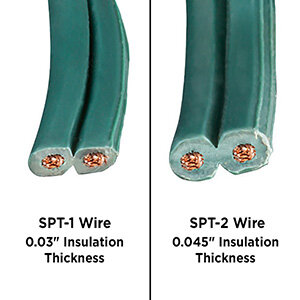SPT-1 vs SPT-2 Wire for Christmas Lights: What’s the Difference?
Now that the holiday season is nearly at hand, it’s time to start getting out lights and decorations. If you are making repairs to strings for the first time or are trying your hand at building custom light strings using stringers or bulk wire, you may find yourself wondering what the difference is between SPT-1 and SPT-2 wire. Sometimes referred to as lamp wire or zip cord, these two wire types are found in more than just Christmas lighting so it’s a question that is asked often. Unfortunately, there is a lot of conflicting information about SPT-1 and SPT-2 wire that tends to cause some confusion. In this post, we’ll explain the difference between SPT-1 and SPT-2 wire and dispel a few of the biggest misconceptions about them.
What’s the Difference Between SPT-1 and SPT-2?
In order to understand the difference between these wires, you must first know what SPT stands for. SPT is an abbreviation for Stranded, Parallel, Thermoplastic, a designation found on most flat wire. This abbreviation is always followed by a number denoting the insulation thickness. Despite what many believe, insulation thickness is the only difference between SPT-1 and SPT-2 wire.
| SPT-1 Wire | SPT-2 Wire | |
|---|---|---|
| Insulation Thickness | 0.03" | 0.045" |
| Use With | SPT-1 Sockets SPT-1 Plugs |
SPT-2 Sockets SPT-2 Plugs |
| Durability | Withstands most climates when used seasonally (less than 90 days) |
- Thicker insulation protects against long term UL light exposure - Thicker insulation provides protection in extremely cold climates |
| Idea Use for | Seasonal installations (less than 90 days) | - Permanent installations (longer than 90 days) - Extremely cold climates |
spt 1 vs spt 2 comparison chart
Common SPT-1 and SPT-2 Misconceptions
Amperage
The difference in insulation thickness has contributed to a few misconceptions about SPT-1 and SPT-2 wire. The biggest misconception has to do with amperage. Many think that because the insulation is thicker, SPT-2 wire can handle higher amperage than SPT-1. In fact, a lot of sites state that SPT-1 wire is rated for 7 amps and SPT-2 wire is rated for 10 amps. This is not true. Insulation thickness does not determine the amperage, wire gauge does. The most common wire used for Christmas lighting is 18-gauge, which is rated for 10 amps. This means that both wire types use 10 amps regardless of the insulation. The only thing that will directly affect the amperage is the length of the wire being used. As shown in the table below, the amperage decreases as the length of 18-gauge wire increases.
| Length | Amps |
| 0 to 50 Feet | 10 |
| 51 to 150 Feet | 7 |
| Over 150 Feet | 5 |
Climate
Another misconception is that SPT-1 wire won’t last in harsh weather due to having thinner insulation. This is also not true. SPT-1 wire holds up well in most conditions when used seasonally (90 days or less). It is used in a variety of climates ranging from warm and tropical to cold and snowy.
Exceptions where SPT-2 is preferred
There are two instances when SPT-2 wire is preferred. The first is when your lights are used for an outdoor display that will be up longer than the standard 90 day season. The thicker insulation provides better protection against long term UV light exposure from the sun. The second instance is when the wire is being used in extremely cold climates. Ice and cold can drastically affect all electrical cords, even heavy-duty ones, so having a little extra insulation won’t hurt.
SPT-1 and SPT-2: Which Should You Choose?
Ultimately, the choice between using SPT-1 or SPT-2 wire comes down to personal preference. Many customers choose SPT-1 wire simply because it’s the most popular, easiest to find, and tends to be a little less expensive. Others prefer SPT-2 wire because of the thicker insulation. Once you do make your choice, be sure that your sockets and plugs have the same SPT rating. Otherwise, they won’t fit on the wire.
Safety and Installation Tips
Outdoor Light Safety
Weatherproofing: Select lights specifically rated for outdoor use to ensure durability in various weather conditions
Proper Extension Cords: Opt for outdoor-rated extension cords and avoid overloading electrical circuits.
Installation Best Practices
Secure Mounting: Use suitable clips or hooks to attach lights securely, preventing damage to your home.
Hazard Prevention: Position lights away from flammable items and ensure they don’t obstruct walkways or paths.
Have any questions about SPT-1 and SPT-2 wire? Leave them in a comment below or call 1-800-624-4488 to speak with one of our product experts during normal business hours. Shop our entire line of Christmas Lights by visiting 1000Bulbs.com










